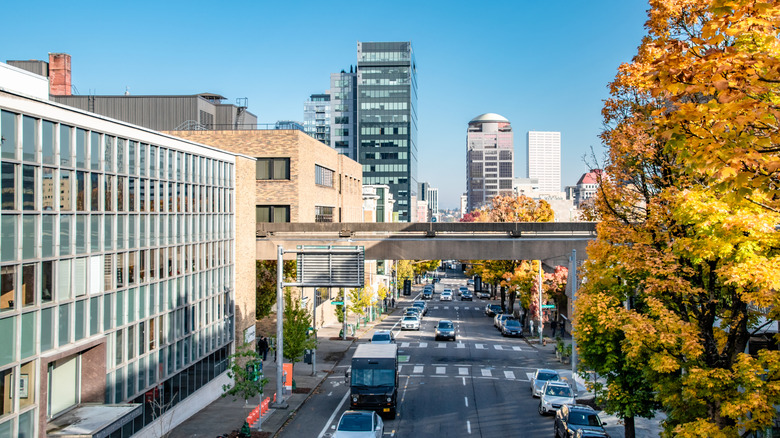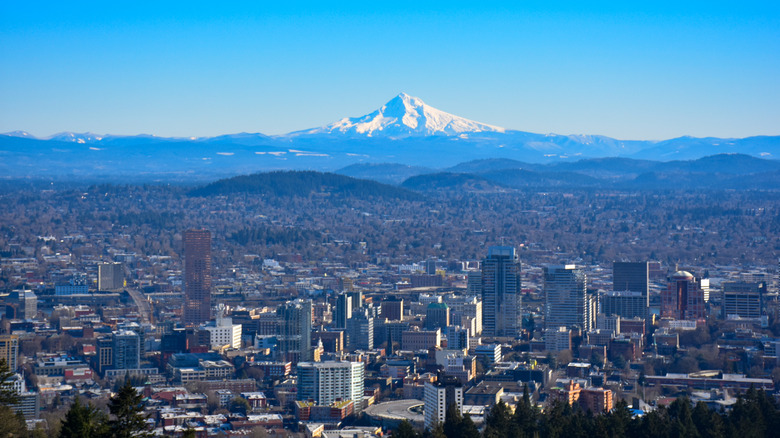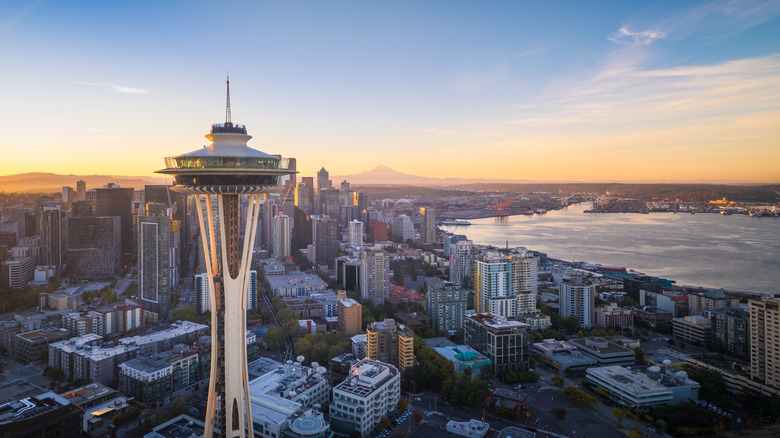America's Two Cleanest Cities Are Located In The Pacific Northwest, Per A 2025 Study
One of the first observations we often make about traveling to a new city is how clean (or unclean) it is. Sidewalk litter, pungent smog, and rats scampering by your feet can make a city feel grimy and uninviting — things you're likely to find in cities ranked as America's dirtiest. Bigger cities tend to have a reputation of being less clean, but a 2025 study by Oxi Fresh identified which of those defy that expectation, showing that urban life and a clean environment can coexist. Analyzing the U.S.'s 35 biggest metropolitan areas across several factors, the study ranked the areas by overall cleanliness. The two that came out on top are both Pacific Northwest darlings: Portland, Oregon (in first) and Seattle, Washington (in second).
To make the ranking, Oxi Fresh gave each of the metro areas a letter grade, which is cumulative based on the city's points for seven cleanliness-related metrics: population density, rodent prevalence, cockroach prevalence, vandalism, litter, air quality, and tap water quality. The Portland metro area earned an A+ grade, while the Seattle metro area earned an A grade. In third place was Rochester, New York, earning an A-. By contrast, the dirtiest cities of the 35 studied were Los Angeles (34th) and New York City (35th). The glaring difference between the cleanest and the dirtiest cities is exemplified by the cockroach metric: Only about 1% of Portland homes had cockroaches present in the previous year, while about 20% of NYC homes did.
Other factors that make Portland, Oregon, the cleanest city
Aside from being called "the quietest city in America," Portland's unusual urban tranquility is bolstered by its cleanliness. One factor that contributes to Portland's cleanliness in a big way is its low population density relative to other cities. Data pulled by the Oxi Fresh study put its population density at 375 people per square mile, quite sparse when you consider how the densities of cities like New York City and Los Angeles are in the thousands. With the less densely packed streets in Portland, the waste is less concentrated, which makes it easier for the city to keep up with maintaining public spaces. Add in the city's high air quality and low levels of tap water contaminants, and you can see how it earned its number one spot.
One thing Portland has going for it is its surrounding natural features, including the Willamette River watershed and forests, which help filter air and give it a greener feel. And even 30% of the city itself has tree canopy cover. Because the leaves on all these trees absorb air pollutants, it helps reduce smog and overall air toxins.
Perhaps the biggest influence on air quality and other cleanliness factors is the city's environmentally friendly policies. For example, Oregon's Department of Environmental Quality, which sets standards for reducing pollution from cars and industrial facilities in Portland, implemented a program in 2008 that trimmed 50 million vehicle miles traveled per year. This program prevented around 10,000 pounds of air toxins from being released into the city's atmosphere. Portland also has a joint public-private program called Downtown Portland Clean & Safe, which funds cleaning crews to clear away litter and vandalism.
How Seattle, Washington is a close second in urban cleanliness
Named America's most "outdoor-friendly" city, Seattle has clean streets and good air and water quality — attractive features for travelers who want city energy combined with the freshness of the outdoors. Seattle's population density is nearly double that of Portland's, proving that a city doesn't necessarily need to be low density to remain clean. While Seattle's air and water quality are slightly lower than Portland's, it still performed very well for a big city on these metrics. According to the Oxi Fresh data, the Air Quality Index in Seattle was deemed "good" for 205 days of the previous year. By contrast, Los Angeles had only 37 "good" air quality days. Seattle also has a low rodent prevalence relative to many other cities, with rodents found in only about 5% of households, considerably lower even than Portland's 9%.
Like Portland, Seattle has the benefit of its geography. It's bordered by the Cascade Mountains, whose pristine watersheds supply the city with its clean water. In addition, Seattle's location on Puget Sound also means it benefits from ocean breezes that help maintain fresh air quality. Seattle passed its own Green New Deal in 2019, which is aimed at reducing air and water pollution for underprivileged communities. Plus it has a dedicated "Seattle Clean City" initiative to keep litter and health hazards off the streets.


